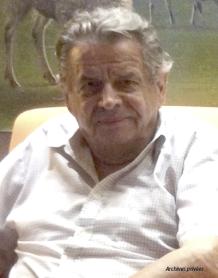Laszlo Szabo, actor-director

Né le 24 mars 1936 à Budapest, Laszlo Szabo est allé au cinéma parce qu’il n’osait pas rentrer chez lui le jour de la mort de sa mère, l’année de ses 11 ans et n’a cessé depuis de fréquenter les salles obscures.
Il relate ainsi son départ de Hongrie et son accueil en France :
« J’ai quitté la Hongrie en novembre 1956 quand les Russes étaient là. Je voulais aller à Paris. J’avais 20 ans. Nous avons été reçus d’une façon formidable. Nous étions un groupe et nous avons passé les cinq premiers jours dans une caserne. Nous partagions les repas avec les militaires. J’essayais de communiquer avec eux mais je ne parlais pas français. Je me souviens que j’avais des chaussures hongroises et que l’un d’entre eux m’a donné des chaussures toutes neuves.
Une semaine plus tard j’étais à la Cité Universitaire. J’étais l’un des premiers réfugiés hongrois à y être admis. J’y ai passé six ans. J’adorais ça. La directrice était comme une maman pour moi. Pendant un an ensuite j’ai vécu à l’hôtel puis dans un appartement d’un ami.
J’allais à l’école d’art dramatique de la rue Blanche où j’ai appris le français. J’adore Molière et La Fontaine et ma professeure était une des épouses de Pierre Fresnay. J’ai eu 17/20 en récitant une tirade de La Flèche dans L’Avare alors que je ne comprenais pas tous les mots...., je comprenais les phrases mais pas tous les mots. Et puis quelqu’un m’a amené sur le tournage des Cousins de Claude Chabrol qui m’a assuré :« demain, tu auras une phrase à dire ». Le lendemain je devais ouvrir la porte sur une pièce où il y avait une surprise party et dire « Je vous demande pardon ! ».
Chabrol m’a ensuite écrit « je te prendrais dans mon prochain film ». C’était A double tour. J’étais le copain de Jean-Paul Belmondo qui débutait et qui jouait un Hongrois nommé Laszlo Kovacs. J’ai tourné avec tous les metteurs en scène de la Nouvelle Vague, Rohmer, Truffaut, Godard, Rivette, Chabrol.
Je veux dire que je dois tout à la France, même ma femme. »
Lazslo Szabo est l’un des deux acteurs à avoir tourné avec tous les réalisateurs de la nouvelle vague. Il a aussi tourné dans un L'Eau froide, en 1994, un film d’Olivier Assayas, fils de la réfugiée hongroise Catherine de Karolyi, dans L'Aveu de Costa Gavras qui dénonce les procès staliniens et L'Insoutenable légèreté de l'être de Philipp Kaufman, d'après le roman de Milan Kundera, réfugié tchécoslovaque aujourd’hui naturalisé français, un film qui relate l'écrasement du Printemps de Prague en 1968.
Devenu réalisateur, il est retourné en Hongrie pour tourner deux longs métrages : David, Thomas et les autres (1985), qui évoque la Hongrie de l’après-guerre dans le regard d’enfants, et Ember, aki nappal aludt az (L'homme qui ne dormait pas (2003).